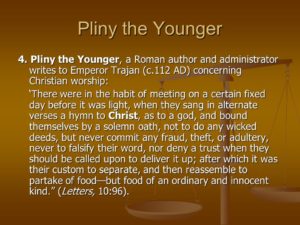[Greek] μυστήριον (mystērion), [Latin] sacramentum: mystery, secret, work, something hiddenMk.4:11,Rom.11:25, Rom.16:25,1Cor. 2:11, 1Cor.4:1,1Cor.13:2,1Cor.14:2,1Cor.15:51, Eph.1:9, Eph.6:19, Col. 1:26, Col. 2:2, 2Thess.2:7, 1Tim.2:7,1Tim.3:9, Rev.17:5
Roman soldiers making an oath
Background Information:
Old Testament: It is only interesting to note that a covenant is much more than a contract. A covenant, involving the exchange of persons and loyalties, carries both blessings and curses. The Hebrew sheba means to swear an oath. The modern day number seven comes from the Hebrew sheba. Essentially, to swear an oath means to “seven oneself” to someone else. The number seven means a number of perfection. It is no surprise that there will later be seven sacraments in the Church.
Roman empire: The sacramentum militaie (military sacrament) was use with new recruits to the army. These soldiers swore an oath of allegiance, receiving a mark (such as a tattoo or a brand) and a new name. A sacramentum was also carried legal connotations associated with funds laid out as surety in a legal case with a sworn oath.
Mystery religions: These religions kept their teachings, rites and practices secret only to their followers. The Greek word mysterion was identified with these mystery religions. However, the Christian idea of mystery becomes more so as of something secret being revealed.
New Testament: This term means mystery or secret. Mystery is made in reference to the kingdom of heaven, God, Jesus, revelation, marriage relationship between Christ and the Church, lawlessness (led by Satan), and the gospels.
Scripture:
“He answered them, ‘The mystery of kingdom of God has been granted to you. But to those outside everything comes in parables’” Mk. 4:11
Jesus presents the kingdom of God in parables to His disciples. Yet the disciples still have difficulties understanding. To others, these parables are understood, but the truth remains hidden. Then to others, these mysteries are partially revealed because of their faith.
“When I came to you, brothers, proclaiming the mystery of God, I did not come with sublimity of words or of wisdom.” 1Cor.2:1
Paul’s mission is to bring God’s plan of salvation to others.
“The mystery hidden from ages and from generations past. But now it has been manifested to His holy ones.” Col. 1:26
Paul preaches God’s word to carry out the divine plan (mystery) to make Christ known to the Gentiles.

The Christians make an oath
Christianity: The Roman Empire and Latin language were absorbing the Greek culture. The traditional sense of mysterion did not adequately describe this process of revelation of God’s mystery. As a way to differ itself from the mystery religions, the Latin sacrament was used to describe access to this mystery. St. Augustine described a sacrament as an outward and visible sign on an inward and invisible grace. Like the military sacramentum, a sacramentum was seen a sign of initiation into the Christian community through baptism and the eucharist. St. Augustine (354-430 AD) stated, ‘The New Testament is concealed in the Old Testament, and the Old Testament is revealed in the New Testament.’ This begins the trajectory of the Greek mysterion from being mysterious to something revealed.
Conclusion:
Sacrament
The sense of the Greek word mysterion changes from something hidden to something revealed. From this we get the word sacrament which provides a more tangible description of this mysterious grace from God. The mystery of God is revealed through the New Covenant through Jesus and the sacraments. It is also interesting to note that there is a direct relationship with covenants and sacraments with oaths. The sacraments become an initiation into the Church.
